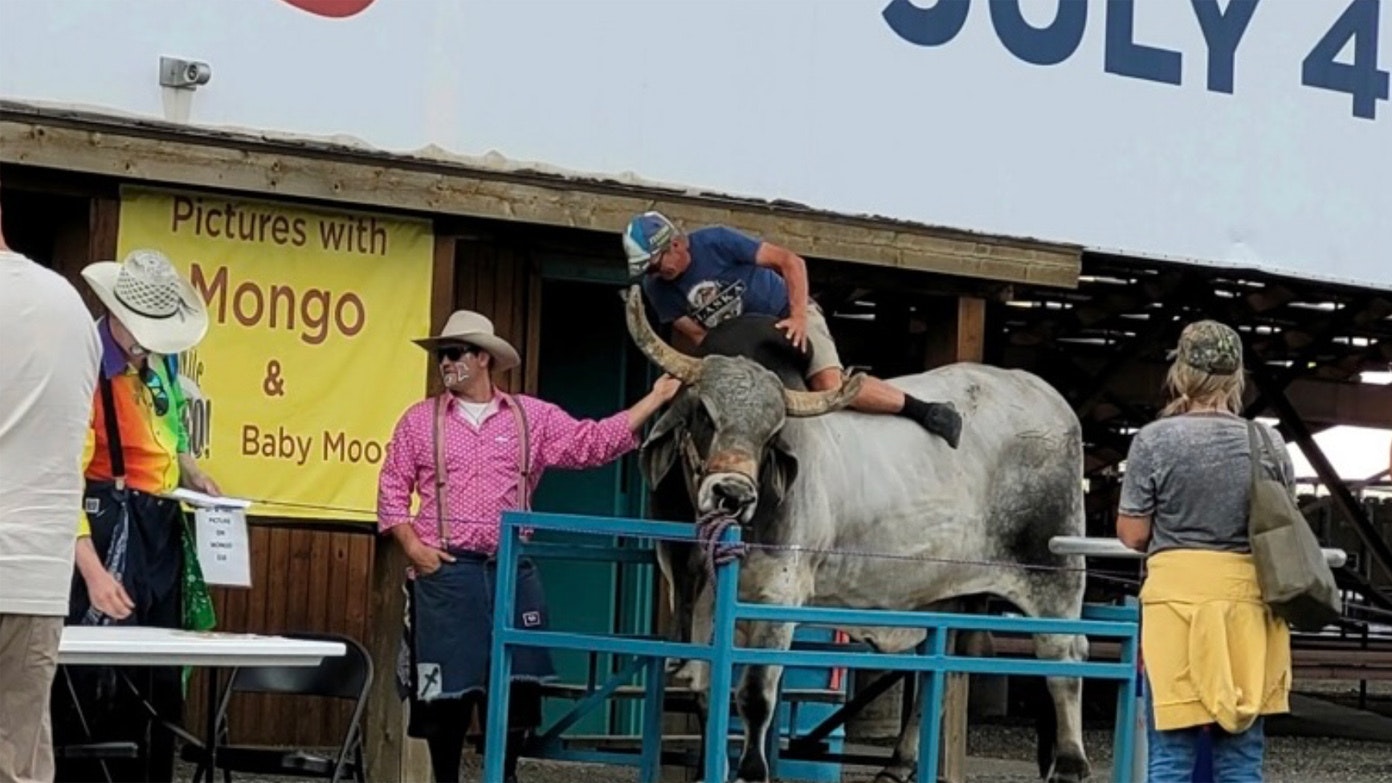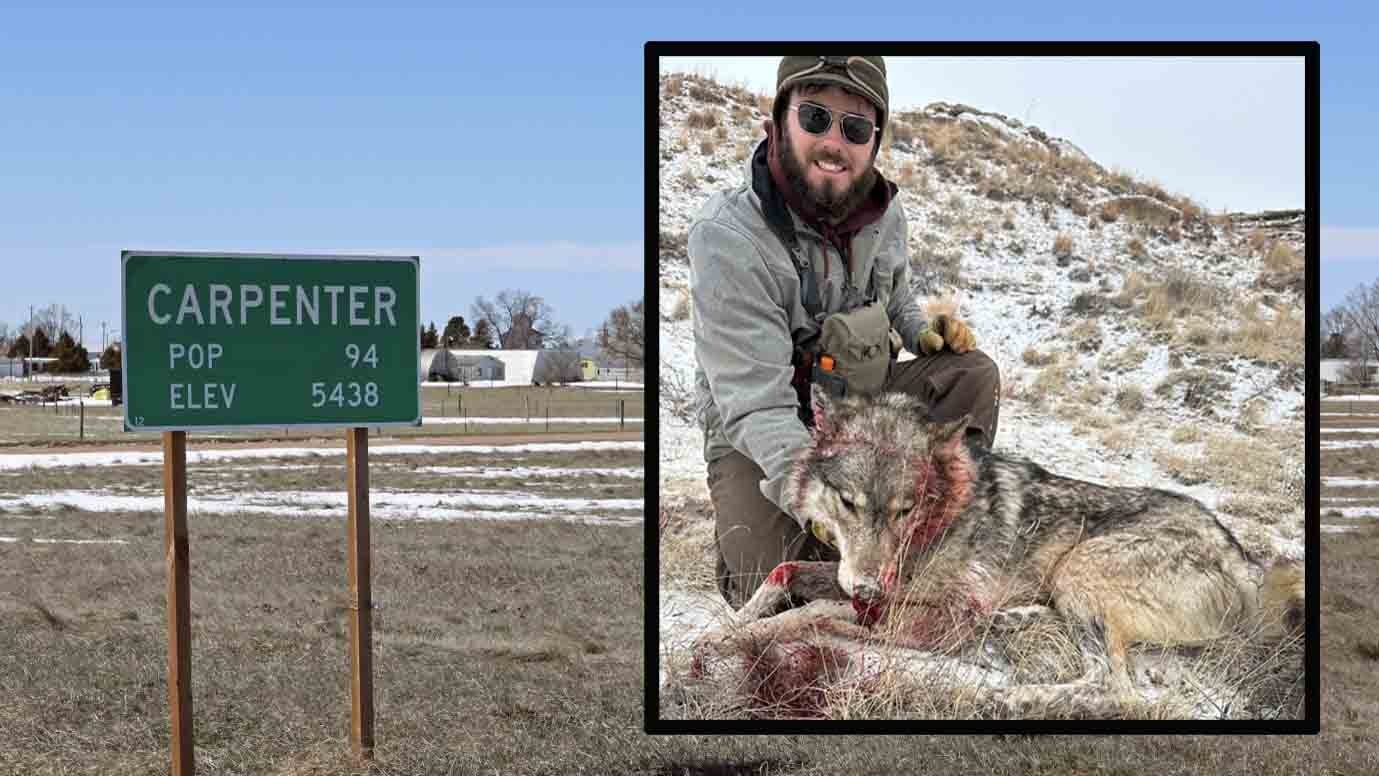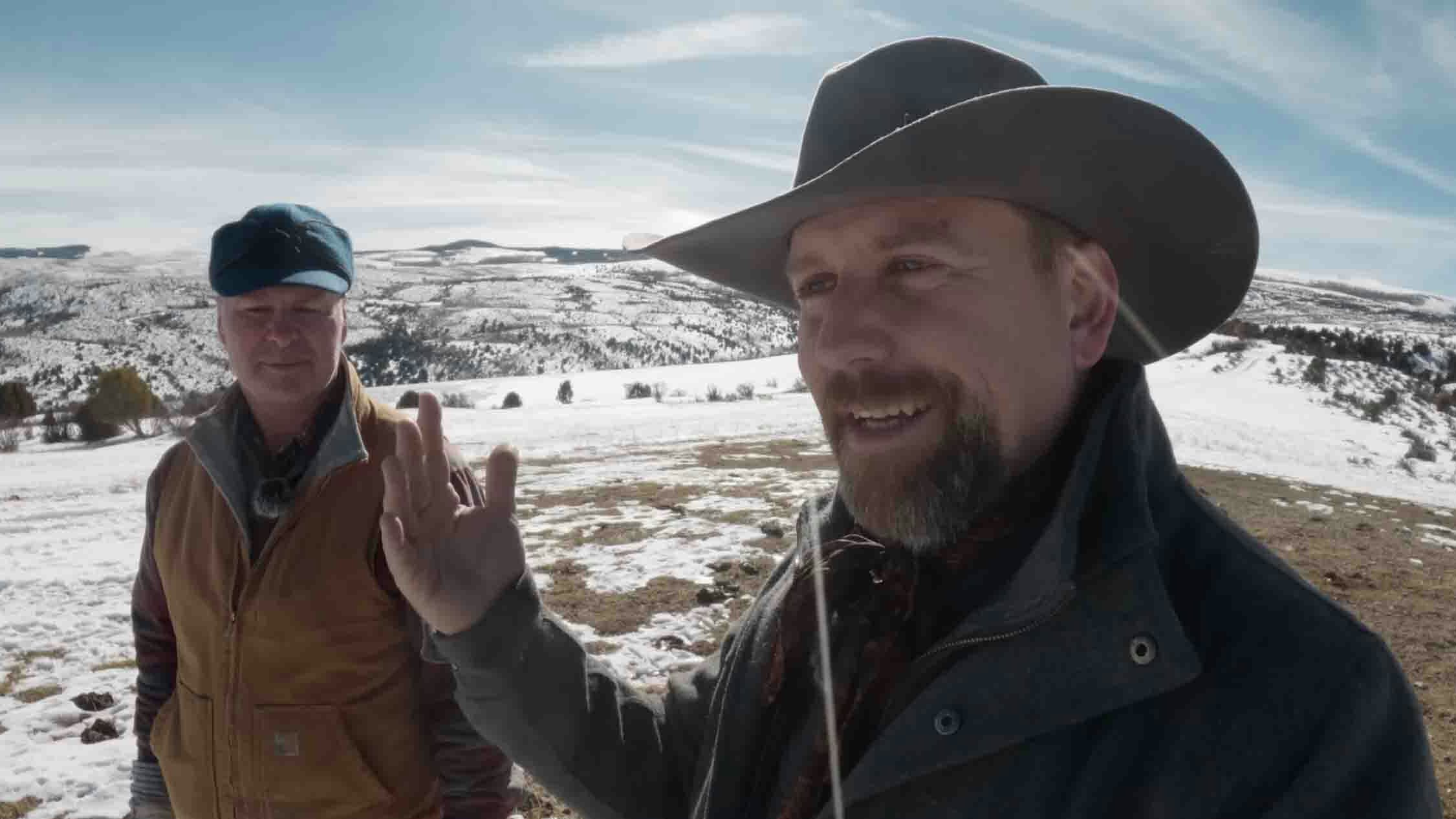A Cody Stampede Board member said he resigned earlier this summer because of the way a 2,000-pound Brahma bull was being treated at the Cody Nite Rodeo.
Ben Williams said animal cruelty and ethics issues were the reason for his departure.
“To me, it’s just a suffering-animal situation,” Williams told Cowboy State Daily. “I’ve been around animals my whole life, that’s why this strikes me so hard.”
Mongo, the bull, is a standalone attraction of his own at the rodeo. Spectators can pay $10 to sit on and get their picture taken on the back of the black and gray bovine stationed near the front entrance of the Stampede Rodeo Grounds. He isn’t used in any of the rodeo competitions.
“Animal welfare is a top priority for the Cody Stampede Board of Directors,” said Marc Thompson, director of the Cody Stampede. “Both the Cody Stampede Board and Mo Betta Rodeo Company have established ground rules that are taken very seriously and adhered to regarding the health, safety and welfare of all livestock on the property.”
Williams had been a member of the board for three years and was the arena director for the Stampede Rodeo Grounds. He is a well-known member of his local rodeo community, hosting rodeo clinics at his W Arena outside Cody.
Maury Tate, owner of Oklahoma-based Mo Betta Rodeo and the bull, is the stock contractor for the Nite Rodeo. Tate denies that the elderly bull named “Mongo” is being treated improperly.
“The bull is doing very good,” Tate said. “I can promise he has not been mistreated in any way.”
The Stampede Board and Professional Rodeo Cowboys Association (PRCA) have also denied Williams’ claims.
“This is something that has to do with a former member of the board,” Tate said. “This has nothing really to do about the bull.”
Williams has described the bull as “crippled” with sore joints and arthritic symptoms. He said a veterinarian report that found the bull with swollen joints and recommendation it be retired was not adhered to.
Various efforts have been made to extend the use of the bull throughout the summer, given daily medication and a sand path to walk on.
“Like with people, you can do stuff to help them manage the symptoms,” Tate said.
Tate said the bull walks as well as any other bull on the premises.
“This is an issue between the board and someone who is no longer on the board,” he said.
Vet Checks
In late June, an animal welfare audit was performed on Mongo after it was reported he had abscesses on his feet. Williams’ son, Trevor Williams, who was volunteering at the rodeo around this time, said he had been instructed to pour out a sand path for Mongo to walk on due to his ailing hooves.
Nikki Tate, wife of stock contractor Maury Tate who also runs Mo Betta, referred to this sand path in a message sent out to the board members, saying Mongo’s feet became sore from standing in water during the first few weeks of the rodeo season.
“Now that the weather has dried out, he (Mongo) makes the trek on his sand path once a day to stand for about an hour on a sand covered chute and gets his Tootsie Pop each night,” she wrote.
Veterinarian Dr. Anthony Scheiber did the animal audit on Mongo. Scheiber didn’t find any abscesses, but wrote in his report that the bull had swollen joints and believed Mongo to be in pain, showing arthritic symptoms.
Tate disagreed with Scheiber’s synopsis that Mongo had swollen knees. Although the bull was diagnosed with arthritic symptoms, Tate pointed out the bull has never been diagnosed with arthritis.
“Usually, when an animal has arthritis they limp, they’re kind of like people in that way,” Tate said. “They’ve always kept a close eye on the bull.”
Cameron Boettcher, a vet tech at Heart Mountain Animal Health in Powell, said this is a relevant distinction, as an x-ray must be performed to diagnose arthritis. No x-rays have been performed on Mongo.
Although the bull was already receiving anti-inflammatory medicine at this time, Scheiber in his report said the bull should be retired and replaced with a different animal.
Scheiber doesn’t solely have the power to order that the bull or any other animal be pulled from the rodeo. That direction must come from the Stampede Board as a whole and be given to Tate.
Minutes from the board’s June meeting confirm that the board members received Scheiber’s report. More than two months after his diagnosis, Mongo hasn’t been removed.
“They pretty much turned a blind eye because they don’t want to deal with the Tates and the Tates know they make a lot of money off that bull,” Williams said.
Thompson said the Stampede Board and Mo Betta have jointly communicated “regarding a plan that is based on Mongo’s best interests and in compliance with our vet’s recommendations.”
“Mo Betta is mindful of Mongo’s condition and age and have provided supplements for joint support, time off when needed, and additional sand for softer ground to stand upon,” Thompson said.
Scheiber did not specify an exact date for when he thought the bull should be retired. He said in an interview with Cowboy State Daily last week the retirement recommendation came with an indefinite timeline.
“It was for sometime in the future because he wasn’t lame that day (of the evaluation),” Scheiber said.
On Aug. 24, one day after Cowboy State Daily first reached out to Tate, he arranged a veterinarian inspection for Mongo at Yellowstone Equine Hospital. The three vets conducting the report there found Mongo without swelling or any other issues, according to a document provided to Cowboy State Daily by Tate.
“It is our opinion that the bull “Mongo” is healthy for his intended purpose as a photo bull,” the hospital wrote.
On Wednesday, Scott Dorenkamp, an animal welfare agent for the PRCA, said because of the Aug. 24 vet check approving Mongo’s use, he considered the matter put to rest. Chad Ball, president of the Stampede Board, agreed with this synopsis.
Dorenkamp and Ball did not respond to follow up questions from Cowboy State Daily.
Scheiber, also a member of the Stampede Board, said he no longer thinks Mongo is in pain, but added, this can be difficult to measure. He declined a request for a follow up interview with Cowboy State Daily.
During the PRCA Stampede Rodeo over Fourth of July weekend, the biggest rodeo event of the year in Cody, a special promotion was given during the opening ceremonies by announcer Boyd Polhemus. He encouraged people to check out Mongo.
Williams said he found it disturbing that extra encouragement was given to riding the bull after the vet report was received. The July Fourth event typically draws 4,000-7,000 fans.
“I got irritated about that,” he said.
Williams demanded his fellow board members tell him who gave Polhemus direction to promote the bull, but Williams said he got no answers. Soon after this he received a notice of reprimand, which led Williams to submit his resignation.
“When it’s an animal suffering you better get in peoples’ faces about that,” Williams said.
Williams said even if the bull is effectively medicated, he doesn’t find this practice to be morally sound.
“To have to daily medicate that bull, just to be able to get him out front, to make money off pictures and have everybody crawl all over him, is pathetic,” Williams said.
Despite no longer being involved with the rodeo, Williams said he and his wife make trips by the rodeo grounds each night, and every night they see Mongo on display.
The Cody Nite Rodeo runs every night from June 1 through Labor Day weekend.
Tate told Cowboy State Daily that Mongo hasn’t been used every night, but Thompson said Mongo is currently used for one hour every night because he is doing “well currently.”
Tate said they have been working in a younger bull that will eventually replace Mongo, but as of last week, Mongo was still being used.
After her husband’s departure from the board, Kathy Williams wrote a letter to the board, expressing disapproval for how it was handling Mongo.
“This (is) the kind of animal abuse crap that got circuses banned,” she wrote. “When’s the last time you got to take your kids to the circus?”
‘Tail Wags The Dog’
Dorenkamp told Cowboy State Daily previously that even though Tate is a licensed stock contractor, the Nite Rodeo is not a sanctioned PRCA event, so the PRCA can’t force the Stampede Board to remove an animal. It can, however, provide the board and Tate recommendations. He said the PRCA takes animal welfare issues very seriously.
Williams said he loves rodeo and has no desire to see it go away. Rodeo is a sport engrained in Western culture and a major attraction for millions of tourists each year. Many small communities depend on it as a major attraction to bring visitors in.
The PRCA and rodeo industry hold a contentious relationship with certain animal rights groups, which argue that rodeo is a source of animal cruelty.
“Some states exempt rodeos from their anti-cruelty statutes, while other states defer to clearly inadequate Professional Rodeo Cowboys Association regulations to judge whether animal cruelty has occurred in rodeos,” the Animal Legal Defense Fund wrote on its website.
The PRCA has defended its actions and rodeo, arguing that it is an animal welfare agency, advocating for the proper care of animals while maintaining their use by humans.
Williams has questions about which party ultimately calls the shots at the rodeo, the board or Tate.
“It seems like the tail wags the dog out there,” Williams said.
Under Tate’s contract with the Stampede Board, the board reserves the right to require the stock contractor to obtain additional stock or replace stock. This contract says the contractor shall use PRCA rules as a guide, but only when applicable to the Nite Rodeo events.
Scheiber brought up other animal issues in his vet report, including calves that were thin and unhealthy and “should not have been used for the (rodeo) performance.”
“There needs to be enough healthy calves for each rodeo performance and weak, thin or sick calves to be separated and treated before they are allowed in a rodeo performance,” he wrote.





